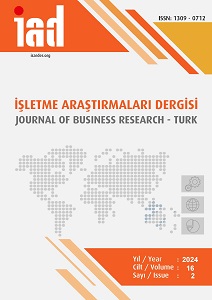#VirtualMarketing Dynamics: Leximancer-Driven Insights from Social Media Trends
#VirtualMarketing Dynamics: Leximancer-Driven Insights from Social Media Trends
Author(s): Yavuz Selim BalcıoğluSubject(s): Media studies, Business Economy / Management, Marketing / Advertising
Published by: Orhan Sağçolak
Keywords: Virtual Marketing; Leximancer-Driven Insights; Social Media Trends;
Summary/Abstract: Purpose – This study explores into the field of virtual marketing, an essential aspect of contemporary business strategies that utilizes web-based technologies for the efficient dissemination and engagement of marketing content. It aims to decipher how virtual marketing is portrayed and discussed in usergenerated content (UGC) on social media platforms, with a specific focus on Instagram. Design/methodology/approach- The research employs a mix of text mining, thematic analysis, and textual analysis to scrutinize a substantial dataset of social media posts related to #VirtualMarketing. It integrates Social Exchange Theory and the Social Media User Engagement Framework to investigate user engagement dynamics on social media platforms. This methodology enables a comprehensive examination of themes, and engagement patterns in UGC that is related to virtual marketing. Advanced data analysis tools, including Leximancer for thematic content analysis and Python is applied. Findings – The findings reveal that virtual marketing on social media covers a broad range of practices, from entirely digitalized strategies to hybrid models that incorporate traditional marketing elements. The study identifies the predominant themes in virtual marketing, assesses the textual orientation of the related content, and explores the relationship between these themes and various user engagement metrics. Discussion – These findings underscore the pivotal role of social media in shaping virtual marketing strategies and emphasize the necessity for more extensive content analysis in this area. The study contributes to the academic discourse on virtual marketing by providing empirical insights into the trends and patterns present within UGC. Furthermore, it presents a practical framework for the analysis of large-scale textual data on social media, showcasing the effectiveness of computational qualitative analysis with NLP in enhancing understanding and strategies in virtual marketing. This research provides a valuable resource for future studies in the social sciences, especially those utilizing NLP to investigate the dynamics of virtual marketing.
Journal: İşletme Araştırmaları Dergisi
- Issue Year: 16/2024
- Issue No: 2
- Page Range: 837-851
- Page Count: 15
- Language: English

